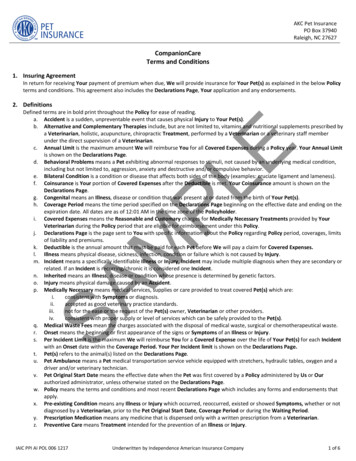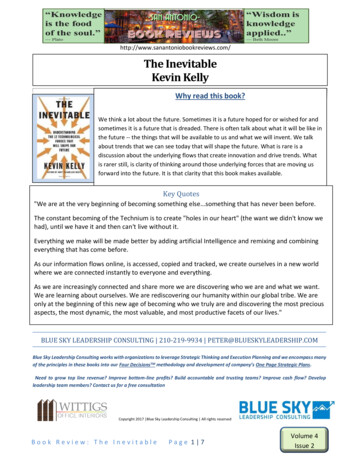
Transcription
Insuring Your Future:Your guide to life insuranceand multiple sclerosis
COVER ARTWORKHeather KertzerLe Café, Pastel“The reason to paint any picture is to share myfeelings about life itself. When I paint I tell theviewer what I like, what I believe, and what I'mconcerned about.”Heather Kertzer is an award-winning artist fromBarrie, Ontario. Her first career was in cartography.Following a diagnosis of multiple sclerosis at the ageof 36 she turned to art full time.Painting played a major role in enabling Heather tocope with her illness, and provided a cathartic outlet.Gradually her technical skills improved, she enteredlocal shows and she became increasingly involvedwith the art community.Much of Heather's work is inspired from her love ofnature.You can learn more about Heather, her portraits ofanimals and her award-winning work by visiting herwebsite, www.heatherkertzer.ca
INSURING YOUR FUTURETable of ContentsIntroduction .3Do you really need life insurance? .4The insurance industry view .5Choosing a provider.7The right amount of coverage.8The application process.8Substandard insurance .9Life insurance alternatives.12Group life insurance.15Mortgage insurance.16Need more information? .18Glossary of terms .19www.mssociety.ca
INSURING YOUR FUTUREIntroductionThe life insurance industry has traditionally marketed itsproducts to the majority of Canadians who are insurable atstandard premium rates. Insurance companies market tohealthy young adults who are beginning careers, startingfamilies, buying homes and incurring the financial obligationsthat accompany these decisions.More recently, the insurance industry has begun to develop amore diversified rating structure and can offer specializedinsurance products to people with some common healthproblems, such as diabetes. The industry is still hesitant,however, to include more uncommon health conditions, suchas multiple sclerosis, for coverage of any kind.The primary reason stated for this unwillingness to insure isthe lack of viable statistical data on the effect of MS onmortality. Insurance companies often associate MS withsignificantly reduced life expectancy rates because the industryis still using data that does not reflect changes brought aboutby a better understanding and management of the disease. Asa result, the life insurance industry's guidelines state thatmultiple sclerosis is a progressive disorder 85% of the timewith a median survival of 35 years after diagnosis. This viewcontinues despite research indicating that MS has little impacton the life expectancy of most persons with MS.www.mssociety.ca3
INSURING YOUR FUTUREThe Multiple Sclerosis Society of Canada is working to changethe view that the insurance industry has of MS, but at thesame time, it realizes that people who have MS have insuranceneeds now. Insuring your future: Your guide to life insuranceand multiple sclerosis offers immediate assistance to peoplewith MS who need to make decisions that will affect them andtheir families right now.For the convenience of the reader, definitions for some basicinsurance terms, which appear italicized in the text, can befound in the glossary.Do you really need life insurance?Not everyone needs life insurance. You may want to askyourself the following questions:Does anyone in my family depend on my earnings to supportthem? For example, a spouse, young children, elderly ordisabled relatives. Yes NoDoes my family's lifestyle depend upon my income? Yes NoWould my family be faced with extra expenses to replace thecontributions I make at home in the event of my death? Forexample, housekeeping, child-rearing or custodial care. Yes No4www.mssociety.ca
INSURING YOUR FUTUREIs there someone who will incur large debts in the event of mydeath? For example, outstanding car loan or funeral expenses. Yes NoWill my business associates be unduly penalized financially orneed to replace my expertise in the event of my death? Yes NoAre there any other expenses I should consider? For example,could my family pay for my children's university education inthe event of my death? Yes NoIf you answered “Yes” to any of the above questions, thepurchase of life insurance, if possible, may be the best way ofproviding for your financial obligations in the event of yourdeath.The insurance industry viewInsurance companies group people according to the type ofrisks they represent. Being diagnosed as having MSautomatically puts you in the category of having a chronicdisease that is perceived as having some impact on mortality.www.mssociety.ca5
INSURING YOUR FUTUREInsurance companies consider the degree of disability anddisease course as key factors when underwriting MS. Other riskfactors include age at onset, amount of time between first andsecond attacks, multiple system involvement, sex and initialsymptoms. If you have a life insurance policy which youobtained prior to diagnosis, you are under no obligation toinform the insurance company of your diagnosis. Even if youdo, your company would have no right to change yourcoverage or premium in any way (unless you have allowedyour policy to lapse). See “keep current standard coverage”,for more information.If you are new to a plan, very often a company will postponeconsideration of a risk for a specified period of time which canbe frustrating for someone wanting to know if they can getcoverage. For example, if an individual has been newlydiagnosed, has a tentative or suspected diagnosis of MS or hashad a recent MS exacerbation, and a company has a preexisting condition clause, a company will usually postponeconsideration of coverage until at least two years after thediagnosis or exacerbation to determine the progression andcharacter of the disease and make an underwriting decision.Keep current standard coverageIf you have standard life insurance coverage that was issuedprior to your diagnosis, be sure to maintain it. Continue to paythe premium when it is due because failure to do so couldinvalidate any future claim made on the policy.6www.mssociety.ca
INSURING YOUR FUTUREAlso, carefully consider the ramifications if an insuranceprovider suggests he or she can get you a better policy orcoverage. It is unlikely that you will be able to buy standard lifeinsurance coverage once you have been diagnosed with MSuntil the insurance industry is persuaded that the mortality rateof people with MS is not that much different than the rest ofthe Canadian population. Further, you usually have acontractual right to convert your life insurance to a plan with alevel premium for life at a standard rate. If you took terminsurance prior to being diagnosed, it may be worth your whileto look at conversion.Choosing a providerBefore you purchase insurance, you need to decide whetheryou want to buy through a direct insurer, an agent, a broker ora group plan. Agents and direct insurers represent oneinsurance company and offer the products of that company.A broker contracts with a limited number of insurancecompanies and can offer their various products. Using a brokerallows an individual to compare a number of differentproducts. You also may be able to purchase insurance througha group plan offered by your employer, alumni association orother group affiliation. Please read the section “Group LifeInsurance and MS” for more details.www.mssociety.ca7
INSURING YOUR FUTUREThe right amount of coverageThe amount of personal life insurance you may apply for isusually limited to 10 to 15 times your annual incomedepending on your age (the younger you are the higher theamount because your survivors will need to replace yourincome for a longer period of time). However, if you areinvolved in a business, the insurance company will require afinancial statement. If you are on the verge of bankruptcy ordo not have a significant income, your application may berejected on the basis of financial grounds, not medical grounds.The application processThe insurance company will request information from yourdoctor to assist them in arriving at a prognosis regarding yourlife expectancy. Since the medical information requested onmost applications is very general, it is often not adequateenough for the purposes of evaluating MS. One possiblesolution is to let your doctor know that you have applied forinsurance coverage and request that he or she send detailedinformation to the company that fully describes yourexperience with MS, when the company requests thisinformation.8www.mssociety.ca
INSURING YOUR FUTURETo receive the best possible insurance rating, ask yourphysician to promptly respond to the company request bysending a letter outlining: your age at onset; initial symptoms; amount of time between your first and second attack; history of illness including hospitalizations; current symptoms; current medications and treatments (and their effects); and, current level of function.If your doctor provides sufficient detail, the company can makea better rating decision. The more information that is provided,the better an insurance underwriter can assess yourapplication.Substandard insurance(also known as rated life insurance)If you have MS, you may be offered coverage but at a higherpremium. This is called substandard life insurance.Substandard policies are offered to individuals who may nothave a normal life expectancy.Generally speaking, people who have mild to moderate MS(Kurtzke Expanded Disability Status Score of less than 6.0)are considered to have more favourable risk factors and maybe offered substandard insurance.www.mssociety.ca9
INSURING YOUR FUTUREIf there has been little or no disease activity from two to fiveyears after diagnosis, the rating is usually 200 to 100. Inother words, you may have to pay 100 - 200% more for asubstandard policy than for a standard one. If there has beenno disease activity from 6 to 10 years, the rating should be 100 to 50, and if there has been no disease activity for over10 years, the rate may be standard.People who have secondary progressive or primary progressiveMS are usually declined.When deciding whether or not to accept a substandard policy,it is wise to ask your insurance representative to explain theimplications of the offer in terms of increased cost per monthor year.You might want to consider a substandard offer if you do nothave standard life insurance in force. You then could ask abroker to check with other insurance companies to see ifanother company would be willing to offer you coverage on amore favourable basis.To speed the search along, the broker can have you sign aform authorizing the initial insurance company to share yourmedical records with other companies. It is advisable tocontinue to pay the premium on the substandard policy untilyou are accepted for a more favourable offer.You can always apply to change the conditions of yoursubstandard policy at a later date. If you have had no acuteMS attacks and have been in remission for several years, you10www.mssociety.ca
INSURING YOUR FUTUREmay want to consider reapplying for insurance to obtain abetter rating. If your health is worse at the time of reapplying,the company will make no change. If your health is better, thecompany will want to keep you as a policy holder and maymake an offer with a lower premium. You probably should sayyes to this offer.Remember, continue to pay the premium on thesubstandard policy until you are accepted for themore favourable rating.Risk factorsFavourableJill Snow was diagnosed with MS at age 32. At that time, sheexperienced problems seeing which was attributed to theonset of optic neuritis; small lesions could be seen on her MRI.She has had two relapses since the initial onset of her MS, thefirst about a year after her diagnosis and the second two yearslater. She recovered almost completely after each attack andhas experienced little disability. Jill's son lives close by andvisits often. Jill enjoys her work as a bookkeeper and looksforward to seeing her bird watching group on the weekends.www.mssociety.ca11
INSURING YOUR FUTURERisk factorsUnfavourableJim Smith was diagnosed with MS at age 42. He hasexperienced repeated MS attacks and a worsening of hisdisability which forced him to stop working.His first MS attack was followed six months later by a secondmore severe attack that permanently affected his sight andmobility.Jim often has difficulty walking and usually feels dizzy whentransferring from his scooter. His doctor told him that there arelesions in the cerebellum of his brain which can be seen on hisMRI. Bill used to be very active but he finds it increasinglydifficult to keep up with friends, especially since his wifepassed away several years ago.Life insurance alternativesIf you are having difficulty obtaining traditional life insurancecoverage, there are some strategies you may wish to considerfor insuring your future:1. Ask an insurance broker to “shop” your application withother insurance companies to determine if there is anothercompany that will offer you insurance on some basis.2. Several life insurance companies offer “guaranteed issue”life insurance to people over age 55 (or in some cases lessthan age 55). Other companies provide insurance toindividuals of any age regardless of a health condition. The12www.mssociety.ca
INSURING YOUR FUTUREpremium for this type of insurance is usually higher thanstandard life insurance and the amount paid in the event ofyour death is usually under 50,000. Your insuranceprovider can research this possibility for you.3. Funeral or final expense plan policies also are available inthe insurance marketplace. Most of these policies aresimilar to 'guaranteed issue' policies and may not requiremedical information. The coverage available under this typeof policy is usually limited. Your insurance provider canresearch this type of plan for you.Please note: If you are considering purchasing guaranteedissue and/or final expense plan policies, please be aware thatsome policies contain a provision stating that the amountpayable is a return of only the premiums paid, plus interest, ifthe policy holder dies within the first two years of the policy.4. You may want to ask your insurance representative toinvestigate accidental death policies. These policiesprovide benefits to a beneficiary in the event of accidentaldeath, such as in an auto accident. MS will not increase thelikelihood of your dying by accident so you probably wouldbe able to purchase this type of coverage on a standardbasis.5. Credit card companies and some banks occasionally offeraccidental death coverage to their cardholders withoutproviding medical documentation. In some cases, the first 1,000 or 2,000 is free. There may be limitations to thiscoverage, so be certain to read the policy carefully.www.mssociety.ca13
INSURING YOUR FUTURE6. Periodically, some group insurance plans, (coverageprovided through your employer) offer increased lifeinsurance benefits to their policyholders and may notrequire additional medical information. If presented withthis option, you might want to take this opportunity toincrease your group life insurance benefits.7. Occasionally professional organizations provide theirmembers with insurance coverage at special rates and withspecial underwriting considerations. You might be able toobtain life insurance coverage if the application does notinclude questions about your health status. There may belimitations to this coverage, so be certain to read the policycarefully.8. Often large, long-term purchases, such as automobiles, arelife insured so that, if the purchaser dies while the debt isstill owing, the outstanding balance is paid in full. If theapplication for coverage on the outstanding balance doesnot request information about your health, this coveragecould probably be offered to you. However, while coveragemay be offered, be cautious if you are not asked formedical information because it may be medicallyunderwritten at the time of your claim.9. Invest for the future. Take the amount of money that youhad intended to invest in life insurance and invest it in anretirement savings plan, mutual fund(s) or other investmentvehicle. This will provide your beneficiary with some incomein the event of your death. You may want to speak with afinancial advisor to determine the right investment andpayment plan for your lifestyle.14www.mssociety.ca
INSURING YOUR FUTUREConverting group coverageIf you are leaving a workplace that provides group coverage,you have the option to convert your group coverage to apermanent life insurance or individual term insurance (i.e. termto 65) policy, without having to provide medical information.The conversion must be done within a limited time (usually 31days) from your last day of work. Before accepting theconversion, compare the rate for each type of policy. Thepremium for permanent life insurance is higher than thatcharged for individual term insurance.Group life insuranceOften employers provide group insurance coverage to theiremployees. The most common amount of coverage availableunder group insurance plans is 1 to 1-1/2 times the annualsalary. Many plans provide lesser amounts for spouses andchildren. For some people, particularly those who have no orfew dependants, this amount of coverage may be sufficient.Others may wish to apply for individual life insurance coverage,also called “optional life insurance”, in addition to groupcoverage, depending on their personal financial situation.www.mssociety.ca15
INSURING YOUR FUTUREAn individual with group coverage who develops MS while inthe workplace will remain covered under the group plan and isunder no obligation to disclose the diagnosis. However, if youare diagnosed as having MS and then become employed, youmay be declined group coverage offered through youremployer. Many group plans do not cover pre-existing illnesses.This is because it is very costly for an employer to include aspecial requirement under a group benefit plan to coverindividuals with pre-existing illnesses, such as MS. Others mayoffer coverage, but may have a 3 -12 plan, meaning, the first12 months of coverage for any claims or conditions for which aperson has been diagnosed or treated in the 3 monthsprevious to coverage are denied. Individuals who cannotobtain coverage through their employer's plan may wish toconsider individual or “optional” life insurance coverage.Typically, additional health information would need to beprovided for optional life insurance.Mortgage insuranceMany banks and other lending institutions offer insurance tocover mortgage payments in the event of death. You may beasked to apply for mortgage insurance when purchasing ahouse and financing the mortgage through a lendinginstitution. If you are asked questions about your medicalhistory, it is unlikely that coverage will be offered if you have MS.16www.mssociety.ca
INSURING YOUR FUTURETThe reason for the refusal is based on the fact that applicantsmust fall within the standard category (in other words, theymust be free of medical conditions which can adversely affectlife expectancy, such as MS). If your application for mortgageinsurance has been declined, it does not mean that you cannotobtain individual life insurance on some basis. Insurancecompanies specializing in individual life insurance have muchgreater freedom to tailor-make substandard policies than dogroup insurers. You may want to consider a substandard policyor term insurance to cover the mortgage. Ask your insuranceprovider for assistance.www.mssociety.ca17
INSURING YOUR FUTURENeed more information?For information on disability insurance, see the MS Society ofCanada publication, A Guide to Employment and IncomeSupport. This can be obtained by calling your local chapter ordivision (1-800-268-7582) or by accessing the publicationonline at: www.mssociety.caFor more information about insurance visit your local library orcontact the MS Society of Canada, or one of the organizationslisted below:Canadian Life and Health Insurance Association(CLHIA)This non-profit association has a variety of free publicationsthat discuss many aspects of life insurance.20 Queen Street WSuite 2500Toronto, Ontario M5H 3S2Toll free: 1-800-268-8099Fax: (416) 977-2221www.clhia.caInsurance Canadawww.insurance-canada.caAn internet source of information for consumers, professionalsand businesses about insurance related topics.18www.mssociety.ca
INSURING YOUR FUTUREGlossary of termsNOTE TO READER: For more detailed information anddefinitions, please contact the Canadian Life and HealthInsurance Association or consult your insurance provider.ACCESS TO PERSONAL INFORMATION: If you want toknow what personal information an insurance company hasabout you in its records, you can, with proper identification,write to the company and request the information be sent toyour doctor. A fee may be charged to cover administrativecosts. Medical information may be released to you onlythrough your personal physician. Also, you may correct whatyou believe to be incorrect information.ACCIDENTAL DEATH AND DISMEMBERMENT: Guaranteesan additional payment to the beneficiary, often doubling theamount of the policy should the insured die in an accident. Italso may provide payment on the loss of limbs or eyesight as aresult of an accident. This benefit might be available at astandard rate even if a substandard policy was issued.www.mssociety.ca19
INSURING YOUR FUTUREBENEFICIARY: The named recipient of the proceeds of a lifeinsurance policy. This can be a person, several people, theestate of the deceased, an institution or charity. The proceedscan be payable simply in cash to the named individual(s) ormay involve more complex financial and legal specifications.There are tax incentives to naming a charity, such as the MSSociety, as the beneficiary and owner of a life insurance policy.Consult your insurance agent or the Major Gifts/PlannedGiving Program, for more details, 1-800-268-7582.BROKER: Contracts with a limited number of insurancecompanies and can offer their various products.DIRECT INSURER OR AGENT: Represents one insurancecompany and offers only the products of that company.DISABILITY WAIVER: Pays the premium on the policy andkeeps the life insurance coverage in force should thepolicyholder become disabled. This benefit usually takes effectonce the policyholder has been disabled for a specified periodof time (usually six or nine months). This benefit is not usuallyoffered if a substandard policy was issued.GUARANTEED INSURABILITY: Enables the policyholder topurchase additional coverage at specified times in the futurewithout a medical or other evidence of insurability. This benefitis usually only available to applicants below the age of 40 andwould not be available if a substandard policy were offered,particularly if the impairment was a medical condition, such asMS. People who own standard insurance and who want toincrease their coverage should check to see if they have aguaranteed insurability rider.20www.mssociety.ca
INSURING YOUR FUTUREGUARANTEED ISSUE: Provides insurance coverage to peopleof any age regardless of health. The premiums are usuallyhigher than other types of insurance and the amount paid, inthe event of death, is usually limited to 50,000. Usually, thesepolicies do not provide coverage for the first two years of thepolicy. There are a variety of other benefits and specialized lifeinsurance products that might be available to you and yourfamily. Ask your insurance representative for more information.KURTZKE EXPANDED DISABILITY STATUS SCALE (EDSS):A tool used by physicians to identify and measure the degreeof (dis)ability in a patient with MS. It has two parts. The first iscalled the Functional Systems rating (FS) and the other is theExpanded Disability Status Scale (EDSS). Taken together theyproduce an overall EDSS score which ranges from 0 to 10. Seethe table at the end of this booklet for an overview of theEDSS.LIFE INSURANCE: A life insurance policy pays a specifieddollar amount to your named beneficiary or your estate in theevent of your death. The beneficiary can use the amount asthey see fit, or according to legally specified instructions.www.mssociety.ca21
INSURING YOUR FUTUREMEDICAL INFORMATION BUREAU (MIB): This is a nonprofit association of life insurance companies. Its primarypurpose is to protect insurance companies against fraud ormisrepresentation. When a person signs an application for lifeinsurance he or she authorizes that insurance company tocontact the MIB. Insurance companies inform the MIB when anapplicant has a significant health condition or illness. Thisinformation is shared between MIB member companies, withthe applicant's signed authorization. Information obtainedfrom the MIB cannot be used to make an underwritingdecision, but simply serves to alert companies to potentialfraud or misrepresentation, such as failing to report a healthproblem. Not everyone who applies for insurance has a filewith the MIB. Fewer than 10% of people who have applied forinsurance previously have a record. If you want to know if theMIB has a file on you and if information they might have iscorrect, contact:The Medical Information BureauToll free: 866-692-6901Local number: (416) 597-0590330 University Ave.Toronto, ON M5G 1R7PREMIUM: The amount you pay monthly or annually for aninsurance policy.PRIVACY OF PERSONAL INFORMATION: Life insurancecompanies recognize the importance of protecting theconfidentiality of the personal information they obtain. Allemployees of insurance companies must comply with strictprivacy rules.22www.mssociety.ca
INSURING YOUR FUTURERISK FACTORS: Are used to help insurance companiesdetermine the insurability of a person with MS.FAVOURABLE RISK FACTORS: Low disability; no or littledisability seen after five years; benign or relapsing-remittingcourse; onset before age 40; longer period between first andsecond attack (more than one year); only one system (or areaof the nervous system) involved at onset; onset of opticneuritis or sensory symptoms; small lesions seen on MRI(supratentorial); female; good home support system.UNFAVOURABLE RISK FACTORS: High disability; progressivecourse; onset after age 40; short time between first andsecond attack (less than one year); multisystem (more than onearea of the nervous system) involvement; onset of cerebellarsymptoms; motor weakness; vertigo; confluent lesions on MRIin cerebellum or brainstem; male; poor home support system.STANDARD LIFE INSURANCE: This type of coverage isoffered to healthy adults of any age (up to 85). 90% of allinsurance policies are offered on a standard basis. People whohave no history of illness and do not smoke will normallyqualify for standard premium rates.SUBSTANDARD LIFE INSURANCE: People who presentgreater risks, due to a medical condition or hazardousoccupation, are likely to produce as a group a rate of mortalitythat is higher than normal. To reflect the higher risk, anindividual may be offered substandard insurance, whichcharges a higher premium to reflect the increased risk.www.mssociety.ca23
INSURING YOUR FUTURETYPES OF INSURANCE: Generally speaking, there are twotypes of life insurance: Permanent (whole, universal andvariable) and term life insurance. There are variations in theamount payable upon death which affect the premium thatwill be charged for each type.I. PERMANENT LIFE INSURANCE: Provides insuranceprotection for the entire lifetime of the policy holder andguarantees the premium level to be paid, the death benefitand the accumulating cash value. The only feature notguaranteed is the policy dividend. This type of policy has fourbasic features:1. Level Premiums throughout the life of the policy eventhough the risk of death increases as the policy holderages. The level premium is achieved by charging a higherpremium than the risk requires in the initial years of thepolicy which is invested as a form of savings.2. The policy holder has access to the excess payments or“Cash Value” to borrow against. Usually the cash value isnot added to the amount of insurance coverage that wouldbe payable in the event of death.3. Non-forfeiture options are available if the policyholderwishes to stop paying the premium on a policy that hasaccumulated a cash value. The policyholder can redeem thepolicy for the cash value accumulated or keep the policy inforce by using the accumulated cash value to purchaseadditional life insurance.24www.mssociety.ca
INSURING YOUR FUTURE4. Some permanent life insurance policies are what is called“Dividend Paying”. The dividends from life insurancepolicies are not dividends in the traditional sense of theword; they are not partial distributions of after-tax profitsof a corporation to its shareholders. They are simply partialrebates of overcharged premiums. For that reason, thepolicy holder does not pay income tax on them. Dividendsare not guaranteed and are dependent on the company'sfinancial performance.II. INDIVIDUAL TERM INSURANCE: Provides coverage for aspecified period, for example, for one, five, ten, fifteen ortwenty years or term to age 60 or 80. A death benefit is paidonly if the policyholder dies during the term of the policy. Thepremium usually remains level during the term but increases ifthe term is renewed. Premiums would increase
Your guide to life insurance and multiple sclerosis Our Mission To be a leader in finding a cure for multiple sclerosis and enabling people affected by MS to enhance their quality of life. C81E/07 Disponible en français. Contact the Multiple Sclerosis Society of Canada: Toll-free in Canada: 1-800-268-7582 Email: info@mssociety.ca










